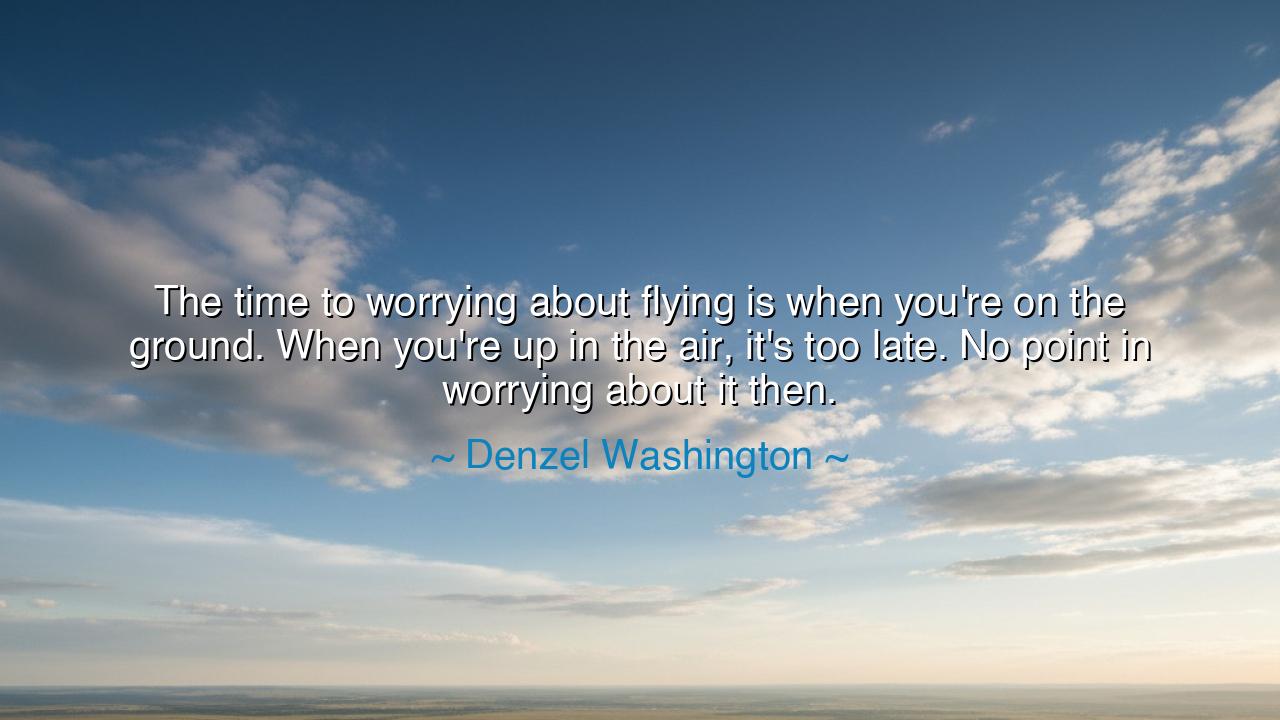
The time to worrying about flying is when you're on the ground.
The time to worrying about flying is when you're on the ground. When you're up in the air, it's too late. No point in worrying about it then.






The words of Denzel Washington, “The time to worrying about flying is when you’re on the ground. When you’re up in the air, it’s too late. No point in worrying about it then,” speak with the rhythm of timeless wisdom. Though uttered in a modern tongue, they carry the weight of an ancient teaching: that preparation belongs to the present, not to the moment when fate has already been sealed. He is reminding us that fear is wasted once the event has begun; the true battle is fought beforehand, in practice, in foresight, in readiness.
At the heart of this teaching lies the division between preparation and panic. While on the ground, a pilot may check the engines, examine the instruments, and plan for the journey. But once in the skies, the hour for doubt has passed. The only thing left is execution. So it is with all of life: worry before action can be useful if it sharpens preparation, but worry after the leap becomes nothing but chains upon the mind. Washington is pointing us toward the discipline of facing fear at the proper time, and letting it go when the moment of truth has arrived.
History bears witness to this principle. Consider the story of the Spartan warriors at Thermopylae. Before the battle, they trained relentlessly, discussing tactics, examining their weapons, and steeling their spirits for what was to come. But once the Persians arrived and the clash began, they wasted no time on fear. To falter then would have been ruin. Their courage was not the absence of fear, but the mastery of it—fear dealt with in the training ground, not on the battlefield. In the same way, Washington’s words teach us that worry belongs to preparation, not to performance.
The deeper wisdom here is also about acceptance. Once you are in the air, once you are in the midst of your trial, there is no undoing it. To dwell on what might go wrong is to rob yourself of strength. Instead, you must focus wholly on what can be done. The past cannot be changed, the leap cannot be taken back. The man who lingers in regret or fear mid-flight is already defeated. The man who accepts the moment and acts within it is the one who survives and triumphs.
This truth can be seen in the life of Abraham Lincoln. For years, he worried deeply about whether the nation could endure. But when war finally broke out, he ceased to indulge in doubt. His task was no longer to wonder, but to act: to lead, to inspire, to preserve the Union. The time for worry was gone, the time for decision had arrived. And by focusing on action rather than regret, he carried the nation through its darkest storm.
To the seekers of wisdom, take this lesson into your own lives: do not waste your strength worrying when you are already in the air. Instead, pour your energy into preparing while your feet are still on the ground. Study diligently before the exam; train faithfully before the contest; reflect deeply before the choice. But when the moment of testing comes, cast worry aside and give yourself wholly to the task. Fear then serves no purpose—it only weighs you down.
The practical teaching is this: when you feel the pull of anxiety, ask yourself—is this the ground, or is this the air? If it is the ground, let your worry guide your preparation. If it is the air, let it go, for the only thing that remains is action. In this way, you will master both preparation and presence.
Thus, let the words of Denzel Washington endure as a teaching of courage and clarity: worry belongs to the time of readiness, not to the moment of flight. When you are on the ground, prepare with diligence; when you are in the air, act with confidence. For those who learn this rhythm will live neither paralyzed by fear nor careless in their steps, but strong, prepared, and unshaken in the face of life’s storms.






AAdministratorAdministrator
Welcome, honored guests. Please leave a comment, we will respond soon